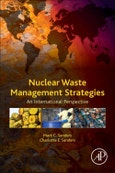Nuclear Waste Management Strategies: An International Perspective presents worldwide insights into nuclear waste management strategies from a technical engineering perspective, with consideration for important legal aspects. It provides a one-stop, comprehensive analysis of both historical and up-to-date nuclear waste management strategies, while consulting important legal aspects of decision-making and implementation processes. With case studies from around the world, this book provides a unique understanding of nuclear waste management technologies and methods available, ensuring that researchers and engineering professionals are equipped with the right knowledge to design, build, implement and improve their own waste management strategies.
This book will benefit those researching and learning in the nuclear energy sector, especially those specializing in nuclear waste management strategies, as well as technical and legal communities within nuclear and environmental areas. It is also a valuable resource for lawmakers and regulatory bodies concerned with nuclear policy and waste management.
Please Note: This is an On Demand product, delivery may take up to 11 working days after payment has been received.
Table of Contents
1. Introduction2. Waste Characterization3. Waste Management Techniques4. International Nuclear Waste Management Frameworks5. Nuclear Liability6. Smorgasbord: An International Overview of Nation StatesAuthors
Mark H. Sanders Sanders Engineering, Las Vegas, NV, USA. Mark C. Sanders holds an advanced diploma in International Nuclear law from the University of Montpellier (France). He is the lead author of the comprehensive journal articles on the nuclear waste management dilemma (Progress in Nuclear Energy 90 (2016) 69-97; 110 (2019) 148-169). During his studies, Mr. Sanders completed courses at the Dickson Poon School of Law at King's College in London (England), obtaining first-class honors. Mr. Sanders is an active member of the International Nuclear Law Association, where he chairs the Radiological Protection working group. He also enjoys participating as a member of the Nuclear Waste Management and International Trade and New Build working groups. In addition, Mr. Sanders along with his spouse, Dr. Charlotta Sanders, are actively engaged in publishing academic manuscripts on nuclear waste management strategies and laws among the major nuclear power producing nation states. In 2018, Mr. Sanders received the American Chemical Society's Energy and Fuels Division's Distinguished Service Medal (Peter Derrick memorial medal).Areas of expertise: Nuclear waste management, Radiation protection, Environmental issues, Nuclear regulation, Regulatory environment, International public law (with a focus on nuclear). Charlotta E. Sanders Sanders Engineering, Las Vegas, NV, USA. Dr. Charlotta E. Sanders is an Associate Research Professor at the University of Nevada-Las Vegas (UNLV), and consulting nuclear engineer with over 20 years' experience in the nuclear industry. She worked on the proposed Yucca Mountain geologic repository in the USA, and is therefore well versed on the technical application of nuclear waste management and transportation. Dr. Sanders is a registered licensed professional Nuclear Engineer in the State of Nevada, and the author of over 60 journal/ conference articles (including several U.S. NUREGs). At UNLV, she teaches graduate level courses in Nuclear Engineering and is responsible for the Nuclear Criticality Safety Engineering Certificate program. Her consulting experience includes URENCO USA, Westinghouse, Entergy, and Nuclear Energy Institute. Dr. Sanders is the recipient of the American Nuclear Society Presidential Citation in recognition of her contributions made to the society's response to the accident at the Fukushima Daiichi nuclear power plant in Japan (2011). In 2018, she received the American Chemical Society's Energy and Fuels Division's Distinguished Service Medal (Peter Derrick memorial medal).
Areas of expertise: Nuclear Engineering, Nuclear Criticality Safety, Radiation Protection and Shielding, Nuclear Waste Management, Nuclear Fuel Cycles








